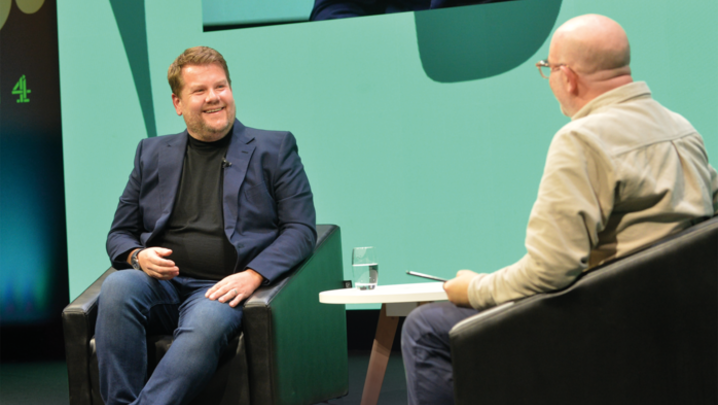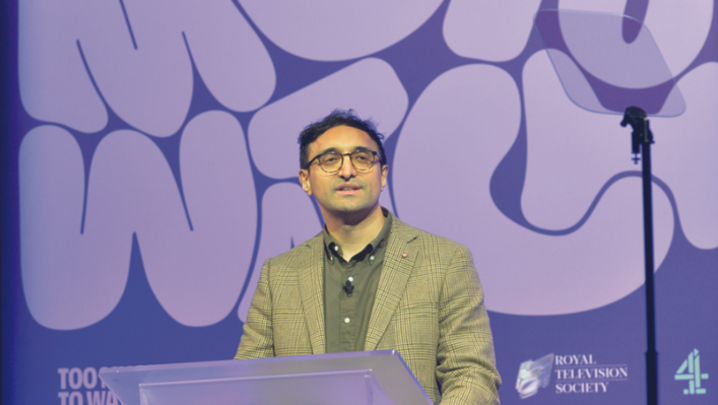Peter Bazalgette looks back on a year when we needed impartial, public service news more than ever.
JANUARY
It’s 6:00pm in London and I’m watching CNN. In Washington, before Trump has finished an insane, incendiary speech about election fraud, his supporters have moved off and started assaulting the Capitol building. This is an extraordinary, deranged Bastille moment. I’m WhatsApping my American friends in the US and UK. They’re already viewing. But US media are outside the building… what’s going on inside?
Within a couple of hours, we find out, courtesy of a career-defining exclusive from ITV News’s Robert Moore, with producer Sophie Alexander and Mark Davey on camera. This is obviously going to become the news report of the year. Subsequent awards bear this out. Robert’s report is the antidote to the outrageous rabble rousing on Fox News, which has depressingly driven CNN to equally polarised polemics.
Beyond Fox are the social media channels, where Hillary Clinton runs a paedophile ring from a Washington pizzeria and Bill Gates is personally monitoring us via a vax-chip in our arms. Never has impartial news been more important.
But why don’t PSB programmes ever explain to the next generation why they’re so reliable? Their ethics, their training, their sourcing. Hats off to Sky News online for including a segment on this. Others take note if you want the under-40s to watch PSB news.
FEBRUARY
More than 10 million watch the final of The Masked Singer on ITV. This South Korean format precedes Squid Game and follows the breakout of the boy band BTS and the four Oscars for Parasite last year. We should be paying close attention to popular culture over there.
A new TV entertainment format achieving 10 million is about as rare as an England penalties victory (see below). Good to remind ourselves, then, of how format hits come about. Commissioners who are cool hunters of new, original themes challenge creative producers with inspiring (not derivative) briefs. The development teams need folk who are not afraid to have ridiculous thoughts. These are the raw materials of all our favourite shows.
Then, budget-holding executives need to have the nerve to take risks. “Simples”, as our leading media meerkat, Aleksandr Orlov, would say. We have more buyers of shows than ever. But how often are they this bold or exacting?
MARCH
The schools reopen after the prolonged Christmas Covid lockdown. We’re also a year on from that first, rather chilling shuttering of the economy, which led to the largest falls in advertising revenue in the history of commercial TV.
But, as the spring crocuses and daffodils appear, it begins to look like advertising may be emerging, even thrusting, out of hibernation, too. Once again, rumours of our death may have been a trifle exaggerated.
Of course, the Euros, Love Island and the Paralympics will be timely stimuli. But most of all, it seems, companies are finding they still need a mass, simultaneous audience to drive sales and curate brand equity. Plus they know that the impacts are all genuine and appear in a safe space, insulated from porn, extremism and paranoia.
These early signs of recovery will be borne out with record revenues by the end of the year. Across Europe, quoted broadcaster stocks have share prices that essentially value this cash income at zero, preferring to concentrate on production capacity and streaming.
Investors are far from foolish to highlight the need for rapid roll-out of data-led, digital streaming services. Yes, UK live viewing has fallen from around 70% in 2017 to just above 50% in 2021. But the much-derided schedule will deliver value for some years to come.
APRIL
BritBox is that rare thing, a co-operation between BBC, ITV, Channel 4 and Channel 5. This is the month the UK service launches on Amazon, another vital part of an ambitious distribution plan. And a reminder that, in 10 years, when most TV signals will be distributed via the internet, a few supranational monopolies will have unprecedented power. What if they don’t want to offer the PSBs in a prominent place, or will only do so in return for an onerous share of revenue or damaging data retention?
The 2003 Communications Act established a principle of PSB prominence on satellite and cable platforms. This was justified by the public benefits that PSBs deliver. It was achieved by giving them the first five channel slots.
The principle remains valid today, but the tech has changed completely. Just look at the plethora of apps on a connected TV. The idea of access, prominence and fair value for the PSBs in the 21st century is understood by both regulators and politicians. They’re beginning to talk about the necessary legislation.
MAY
Speaking of broadcasters under pressure, the news emerges that France’s two biggest commercial channels, TF1 and M6, intend to merge. They have grasped an uncomfortable truth: that for domestic, European content distributors to have a chance of competing with the mega-funded Netflix, Amazon Prime, Apple TV+ and Disney+, they’re going to need to merge just to have a big enough streaming catalogue, quite apart from anything else.
This insight is being driven by RTL, which is a 50% shareholder in M6. RTL is also driving similar mergers in the Netherlands and Belgium. I confidently predict that RTL will merge with ProSiebenSat1 in Germany as soon as it can. All these deals will, of course, need approval by the competition authorities, who might just start looking ahead, rather than myopically in the rear-view mirror (mummified Kangaroo, anyone?).
What will it all mean for the UK?
JUNE
GB News launches. Some of us are applauding Andrew Neil and colleagues for their bravery in starting a news service. We know that good TV and radio news is costly and has to be subsidised. By the BBC licence fee, by advertising revenues and, in the case of Sky News, with a 10-year commitment of subscription money from Comcast.
Can GB News simply go it alone, with no more than what it can sell to advertisers via TV and online?
Well, within a couple of weeks Andrew has retired hurt to the south of France. The station’s technical problems feed the British genius for schadenfreude. If this was an Olympic sport, we’d win gold every year.
The channel soon proves to be less about news and more about comment. The great CP Scott once wrote in a 1921 essay about The Guardian: “Comment is free, facts are sacred.” We might paraphrase that: “Comment is cheap, facts are expensive.”
JULY
On 7 July, England play Denmark in the semi-finals of the Euros. By a mixture of good fortune and canny negotiation, this goes out on ITV. It achieves a peak audience of 27.6 million viewers, which makes the game the most-watched football match ever on a single channel.
A sense of childlike excitement is building in me because I know I have a ticket for the Wembley final, courtesy of Uefa. What a prospect!
As we arrive in a taxi, we get an urgent message to stay in our car until ITV colleagues can reach us with a security detail. What’s happening?
A quick look online reveals that a full riot is taking place. After 45 minutes, they reach us and we’re guided through a scene of devastation. Yes, we just make kick-off and that glorious early goal. But as the match slips away from us, a sense of shame begins to permeate, too. What do we look like on the international stage?
Within seconds of our customary penalties defeat, we see racist abuse of those who failed to score. Often, religion divides us more than it unites us. Is sport the same? Answers on a postcard.
AUGUST
The first legitimate summer holidays for two years. As broadcasting folk melt away to their dachas in Tuscany and the Algarve, nothing really happens at all this month. Something to be grateful for.
SEPTEMBER
PPGMB seems to be in good form (that’s Post-Piers Good Morning Britain). A hapless Insulate Britain supporter appears. When asked whether he’s insulated his own house, Liam Norton refuses to say – an eloquent response.
The authoritative Susanna Reid challenges him and he tells her she doesn’t understand the issue. “Don’t patronise me,” is her sharp reply.
Cue the always-surprising Richard Madeley, who asks whether the M25 sit-ins are fascistic. In a startling non-sequitur, our Liam then asks Richard, “Do you know how many MPs supported Winston Churchill in 1937?”.
Richard is swift in his rejoinder: “I don’t care.” Don’t you love live telly?
OCTOBER
Black History Month. Particularly enjoyable is David Olusoga’s BBC Two series Black and British: A Forgotten History, First Encounters. David is always thoughtful and reassuringly scholarly, but in an eminently accessible way. Ballet Black: Eightfold on Channel 4 is a lovely arts show. Also, a special mention for Benjamin Zephaniah, whose Standing Firm, Football’s Windrush Story on ITV is a superb answer to my exam question above about whether football divides. And yet this strong slate of programming shows that we have come a long way in 30 years.
So I’m surprised (but perhaps not that surprised) to get a letter from a viewer complaining about Black History Month. He asks why there isn’t a White History Month. I’m trying to be diplomatic, but the answer is easy. We’ve had white history month for the past four centuries.
NOVEMBER
To a private room in Claridge’s for what turns out to be a rather charming lunch. We’ve been summoned by that doyenne of analysts, Claire Enders, and Sky’s Stephen van Rooyen to mark the ministerial career of John Whittingdale, or Whitto as he’s universally known. He’s served as Chair of the DCMS Committee, as David Cameron’s Secretary of State, then back in for 20 months as Minister of State for Media and Data under Boris.
A testament to the esteem and affection in which he’s held is the attendance: a who’s who of RTS, Ofcom, Sky, Virgin, the BBC, ITV, Channel 4 and 5. A celebration bordering on a conspiracy, in fact.
Most politicians solely watch the news on telly, and only if they’re on it. Whitto is a genuine and enthusiastic consumer of TV, film, video games and music. Not everyone might agree with all his views, but everyone in that room applauds his career and legacy.
DECEMBER
The end of November brings Storm Arwen to ravage north Wales and the late Georgian folly of Gwrych Castle. All those heavy faux-fortifications do nothing to protect I’m a Celebrity… Get Me Out of Here!, which is obliged to close for three nights.
You may recall that, when widespread floods in Somerset upset the Cameron Government in 2014, a local Ukip councillor told us that this was God’s punishment for legalising gay marriage. What sin have we committed this time, I wonder?
And with that profundity I wish you all a happy and productive 2022.
Peter Bazalgette is Chair of ITV and Co-chair of the Creative Industries Council.
Photo credit: Oceanus Conservation







